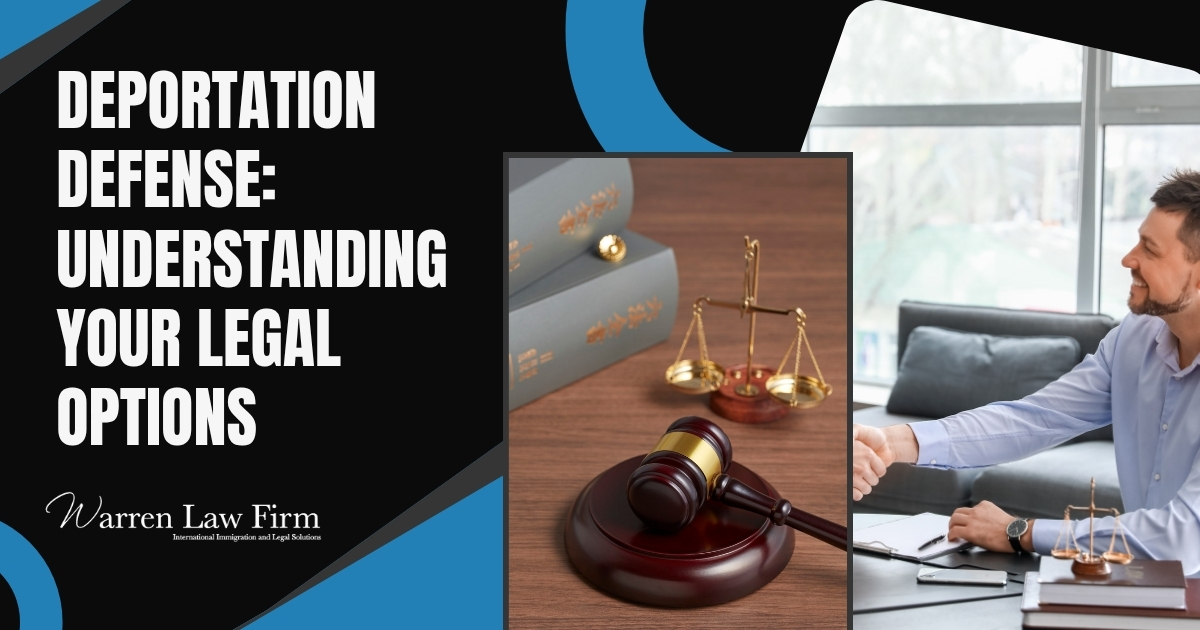Dealing with deportation is one of the most difficult experiences someone can go through as an immigrant. Whether you have lived in the United States for years or recently arrived, the thought of being forced to leave your home, family, and livelihood can feel overwhelming. In this situation, one of the first and most important questions people ask is: Can a lawyer stop deportation?
The answer depends on your specific circumstances, but in many cases, an experienced deportation lawyer can help stop or delay deportation by using legal strategies that protect your rights and explore every possible form of relief. 
What Does Deportation Mean?
Deportation, or removal, is the legal process through which the U.S. government orders a non-citizen to leave the country due to visa overstay, criminal convictions, failure to maintain immigration status, or denial of asylum.
Once deportation proceedings begin, the case goes before an immigration judge. The government will try to prove that the person should be removed, while the immigrant (or their attorney) may present defenses or apply for relief to stay in the United States legally. This process can be intimidating, especially for those unfamiliar with immigration law, and that is why having a lawyer is crucial.
How To Stop Deportation with a Deportation Lawyer
If you’re wondering how to stop deportation, the process begins with understanding your legal options and choosing the right defense for your specific situation. A skilled immigration lawyer can identify the best strategy based on your situation and guide you through each step, including any of the following:
1. Challenging the Government’s Case
A lawyer can examine whether the Department of Homeland Security (DHS) has correctly applied the law in your specific case. Sometimes, errors occur in charging documents, or the government misclassifies a conviction as a “deportable offense.” A legal challenge to the government’s evidence can result in the case being dismissed.
2. Applying for Relief from Removal
Depending on your circumstances, your attorney may help you apply for forms of relief such as:
- Cancellation of Removal: For lawful permanent residents or certain non-permanent residents who meet specific requirements related to residency, moral character, and hardship.
- Asylum or Withholding of Removal: For individuals who fear persecution in their home country due to race, religion, nationality, political opinion, or membership in a particular social group.
- Adjustment of Status: If you are eligible to apply for a green card through a family member or employment, your attorney can help you do so even while in removal proceedings.
- Temporary Protected Status (TPS): Depending on your country of origin, your lawyer may request discretionary relief based on humanitarian grounds.
Each of these options has strict eligibility rules, deadlines, and documentation requirements. A lawyer ensures that your application is properly filed and argued before the court.
3. Requesting a Stay of Removal or Motion to Reopen
Even after a deportation order is issued, it may still be possible to delay or stop removal. A lawyer can file a motion to reopen if new evidence arises or if your previous case was mishandled. Similarly, your attorney can request a stay of removal, which is a temporary halt to deportation, while other petitions or appeals are pending.
Why Does Legal Representation Matter for Deportation Cases?
Statistics consistently show that immigrants with legal representation have far better outcomes in deportation proceedings. Those who appear in court without a lawyer are much more likely to be removed because they may not know all the defenses available to them or how to navigate the system.
An experienced immigration attorney does more than argue your case; they help you understand your options, prepare documents, communicate with immigration authorities, and keep you informed every step of the way. They can also spot opportunities for relief that may not be obvious, such as eligibility for family petitions or protection under U.S. humanitarian laws.
When to Contact a Lawyer
The best time to contact a lawyer is as soon as you receive a Notice to Appear (NTA) in immigration court. Early intervention gives your attorney time to collect evidence, prepare your defense, and explore every possible legal remedy.
However, even if you already have a deportation order, it may not be too late. Attorneys can sometimes file motions to reopen old cases or request deferred action based on changes in your circumstances or new legal developments.
Can a Lawyer Stop Deportation? Find Out with Warren Law Firm
So, can a lawyer stop deportation? In many cases, yes, if the right legal strategy is applied and the case is handled carefully. The key is to act quickly, stay informed, and work with an attorney who understands both the law and the human realities behind each case.
Our immigration attorneys have extensive experience in deportation defense, asylum, and appeals. We are here to help you understand how to stop deportation and fight for the life you have built in America. If you or a loved one is facing deportation, contact Warren Law Firm today for a confidential consultation.
